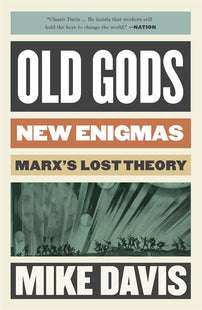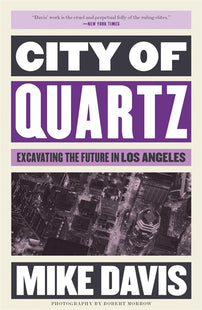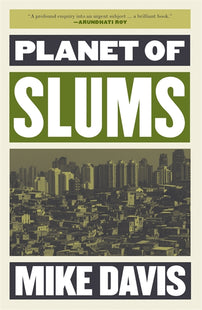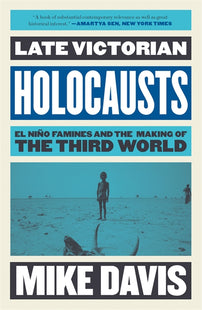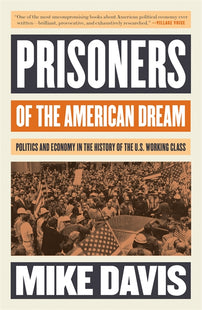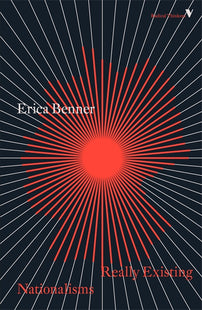Marx at the Chicken Shack
What makes Marx a stranger to Marxist movements is not simply the difficulty of certain key works and passages, but a series of other obstacles.

An excerpt from Old Gods, New Enigmas: Marx’s Lost Theory. Books by and on Marx are currently on sale here.
Read Marx!
Lee Gregovich’s injunction has been rattling around my brain for more than half a century. A good friend of my dad, he was, I suppose, my “red godfather.” His family, like many others from the Dalmatian coast, had emigrated to the copper mines of the American Southwest before the First World War. There they were embroiled in epic labor convicts. Lee told rousing stories about his days as an IWW paper boy, selling the Industrial Worker in saloons and cathouses, and then watching as his father and 1,300 other striking miners, mostly Mexican and south Slav, were arrested by Phelps-Dodge vigilantes, put in manure-floored cattle cars, and “deported” to a bleak stretch of desert in New Mexico. In the 1930s he became active in the Cooks Union in San Diego and joined the Communist Party. The House Committee on Un-American Activities brought its inquisition to San Diego in 1954 and Lee was subpoenaed and then blacklisted by employers. He finally found a job cooking at the Chicken Shack, an old-style roadhouse near the picturesque mountain town of Julian.
When my father had a catastrophic heart attack in my junior year, I quit high school for a semester to drive a delivery truck for my uncle’s wholesale meat company. The Chicken Shack was our most distant customer and once every week or so, after delivering to country restaurants with names like the Lariat and the Lazy J, I’d scuttle up the long road to Julian. On such days Lee and I had a ritual. After the order had been put in the walk-in, he’d pour me a small glass of red wine, we’d talk briefly about my dad’s health or the Civil Rights movement (he was proud that I had become active in San Diego CORE), then, as I got up to leave, he’d slap me on the back and say, “Read Marx!” (I’ve always liked telling this story and was not surprised when a garbled version of it, insinuating that Lee was a mysterious Soviet agent, appeared in my FBI file.)
Lee himself, like millions of other rank-and-file socialists and communists, had read little or no Marx. Wage, Labor and Capital, perhaps, and certainly some Lenin, whose The Teachings of Karl Marx was a popular substitute for reading the old man himself. Most ordinary readers, however, cowered in face of that Everest of theory, Capital. The few who attempted it usually fell into one of the early crevasses of the first chapter and never returned for a second try. This only added, of course, to the mystique of Marx’s genius and the prestige of party intellectuals who claimed to have reached the summit. A study of workers’ libraries in Wilhelmine Germany found that serious proletarian readers were especially interested in Darwinism and materialist interpretations of natural history, not the critique of political economy. Kautsky’s Economic Doctrines of Karl Marx was “more borrowed than actually read.” In 1936, the Menshevik authors of Karl Marx: Man and Fighter — a biography that admirably focused on the thinker as revolutionist — estimated that “perhaps one socialist in a thousand has ever read any of Marx’s economic writings, and of a thousand anti-Marxists not even one.”
Little had changed when I joined the Southern California Communist Party in 1968 in solidarity with their stand against the Russian suppression of the Prague Spring. I was flabbergasted that new members’ political education consisted solely of reading Julius Fucik’s Notes from the Gallows — the stirring last testament of a young Czech Communist executed in 1943, but hardly an introduction to Marxism. My own knowledge was limited to the Paris Notebooks and bits of The German Ideology, recommended in a popular book that I had read on Marx and alienation. The only member of the L.A. Party, young or old, who seemed to have a serious understanding of Marx, and indeed was reading the Werke in German, was newly recruited Angela Davis, and she was fighting too many important battles to have time to tutor the rest of us.
What made Marx a stranger to Marxist movements, however, was not simply the difficulty of certain key works and passages, but a series of other obstacles. Where to begin, for example? If you began at the beginning with dialectics, you had to endure Hegel scowling at you while you became increasingly befuddled — at least, that was my experience while trying to digest Marcuse’s Reason and Revolution during lunch and supper breaks at work. I was delighted years later to discover an epigram in which the young Marx registered his own frustration with the Master and his interpreters:
“On Hegel”
Words I teach all mixed up into a devilish muddle,
Anyone may think just what he chooses to think;
Each may for himself suck wisdom’s nourishing nectar;
Now you know all, since I’ve said plenty of nothing to you!
If you gave G. W. F. a detour, you might discover, with the aid of interpretations by the Marxist Humanists then in vogue, the inspiring Marx of the Paris and Brussels years. (The Holy Family [1845], however, never made my reading list since the only person that I’ve ever known who read it was on acid at the time.) But then, once you thought that you had learned to walk, Althusser came along and the Young Marx suddenly became the Wrong Marx.
With few exceptions, however, the Marx of the Rue Elm and other seminars was disembodied from the “man and fighter.” The works most infused with the passion of the barricades, the extraordinary political analyses of the 1848–50 cycle, were usually ignored by the philosophers. In my unsuccessful autodidact years, Marx seemed either emulsified in incompatible doctrines imposed by party ideologists (Diamat, for instance) or hidden away in mysterious untranslated manuscripts. In addition, it was almost impossible to gain an overview of the oeuvre since the publication of the English version of the collected works was still years in the future. Martin Nicolaus’s translation of the legendary Grundrisse in 1973 — a milestone of the New Left Review/Penguin Books collaboration — considerably leveled the playing field for non-German readers, but it also added 900 pages of required study to the several thousand pages of the four volumes of Capital.
That same year, after losing a coveted niche in the trucking industry, I started UCLA as an adult freshman, attracted by rumors of a high-powered seminar on Capital led by Bob Brenner in the History Department. Brenner and his gang (Richard Smith, Jan Breidenbach, Maria Ramos, and others) were reading Capital in the context of debates within British Marxism on agrarian class struggles and the transition from feudalism to capitalism. Later the seminar moved on to crisis theory and twentieth-century economic history. It was an exhilarating experience and gave me the intellectual confidence to pursue my own agenda of eclectic interests in political economy, labor history, and urban ecology. Apart from Hal Draper’s Karl Marx’s Theory of Revolution and Michael Löwy’s The Theory of Revolution in the Young Marx, both indispensable, I lost interest in Marx studies as it turned from the modes-of-production debate to intensely microscopic battles over the value form, the transformation problem, and the role of Hegelian logic in Capital. “Theory” in general, as it became disconnected from real-life battles and big historical questions alike, seemed to take a monstrously obscurantist turn toward the end of the century. I could never imagine Lee Gregovich imploring anyone to “read Jameson, read Derrida,” much less to wade through the morass of Empire.
Over the years my Marxism became rusty, to say the least. But there comes a time when every old student must decide whether or not to renew their driver’s license. And reading Daniel Bensaïd’s Marx for Our Times, a spectacularly imaginative reinterpretation that breaks free of talmudic chains, whetted my appetite for a fresh look at the “non-linear Marx” that Bensaïd proposes. Retirement from teaching, then a long illness finally gave me the leisure to browse through the Collected Works of Marx and Engels now in English and, in a pirated version, available for free online. Amongst recent writers who have made brilliant use of the Collected Works are John Bellamy Foster, the editor of Monthly Review, who has carefully reconstructed Marx’s powerful ecological critique of capitalism — a new and exciting topic, particularly in light of later socialism’s fetishism of large-scale agriculture; and Erica Benner, who provided an invaluable recovery of Marx’s usually misrepresented views on nationalism. And the mother lode has hardly been mined out: for example, Marx and Engels’s hundreds of pages of acerbic commentaries on the deep games of nineteenth-century European politics, especially the geopolitical chess match between the British and Russian empires, clearly warrant a major new interpretation. Likewise, it would be illuminating to compare his theoretical writings on political economy with his concrete analyses of contemporary economic crises such as 1857 and 1866, topics usually assigned to the footnotes. More generally, I suspect, “Marx on the conjuncture” should become the new slogan of Marxologists.
The panoramic view of the oeuvre now available also makes it easier to recognize the blind spots and misdirections in the collaboration of Marx and Engels. The former, for instance, never wrote a single word about cities, and his passionate interests in ethnography, geology, and mathematics were never matched by a comparable concern with geography (later the forte of anarchists such as Élisée Reclus and Peter Kropotkin). He was relatively untraveled, and only at the very end of his life, desperately sick and seeking the sun, did he venture outside Western Europe. His letters from Algiers, praising the culture and dignity of the Arabs, indicated his capacity to transcend Eurocentric categories and revel in the newness of other worlds. (Alas, if only he hadn’t been so wracked by illness and family tragedy.) The United States was another paradox. Its protean future was often on his mind — he was after all a correspondent for the New York Tribune — and he and Engels worked mightily to win support for Lincoln and Emancipation within the British labor movement. Yet, despite having read Tocqueville, he never focused on the unique features of its political system, especially the impact of early white-manhood suffrage on the development of its labor movement.
There can be no question that Marx saw far beyond the horizon of his century and that Capital, as the Economist (which Marx read faithfully) pointed out a few years back, remains startlingly contemporary even in the age of Walmart and Google. But in other cases Marx’s vision was limited by the anomalous character of his chronological niche: arguably the most peaceful period of European history in a thousand years. Colonial interventions aside, liberal London-centered capitalism did not seem structurally to require large-scale inter-state warfare as a condition of its reproduction or as the inevitable result of its contradictions. He died, of course, before the new imperialism of the late 1880s and 1890s led to zero-sum conflicts amongst the major powers for shares of the world market. Nor could Marx, even after the massacre of the Communards, have possibly foreseen the horrific price that counter-revolution in the next century, including Thermidorean Stalinism, would exact from rank-and-file anarchists, socialists, and communists: at least 7–8 million dead. Since the youngest and most politically conscious tended always to be in the front lines, these repeated decimations of the vanguard entailed incalculable consequences — ones that have been almost entirely ignored by historians.
Likewise, all signs in Marx’s day pointed to the continued erosion of belief and the secularization of industrial society. After the early writings, religion was quite understandably not a topic on his agenda. By the end of the century, however, the trends reversed, and political Catholicism, along a spectrum from embryonic Christian Democracy to the Zentrum to fascism, became the main competitor with socialism/communism in much of Europe, and the major obstacle to left electoral majorities in the 1910s– 20s and 1950s–70s. This surprising Catholic resurgence, almost a second counter-reformation, owed much to the spread of Mariolatry and the church’s aggressive appeal to proletarian mothers. The patriarchal character of the workers’ movement, which Marx and Engels never challenged, made it blind to the forces at work. Despite a household full of strong, radical women, including three daughters who became prominent revolutionists in their own right, Marx never wavered as pater familias, and the movements built in his name, as Barbara Taylor and others have pointed out, actually registered a retrogression from the striking feminism of many utopian socialist sects. Indeed, between Flora Tristan and Clara Zetkin, no woman was able to claim leadership in any of the major labor or socialist formations.
The point, even if initially difficult to swallow, is that socialists, if incomparably armored by Marx’s critique of capitalism, also have something to learn from the critique of Marx and his Victorian extrapolations. I say “critique of Marx” rather than “critics of Marx” since, even in the case of those who were noble revolutionary figures in their own right, such as Bakunin and Kropotkin, the mischaracterizations of Marx’s ideas were quite fantastic (as were his calumnies against them). The cult of Marx, preceded in the German workers’ movement by the cult of Lassalle, justly honored a life of almost sacrificial dedication to human liberation, but otherwise did what all cults do — it petrified his living thoughts and critical method. He, of course, was aware of this danger, which is why he famously said of Jules Guesde and his “orthodox Marxist” wing of the French Workers Party: “Ce qu’il y a de certain c’est que moi, je ne suis pas marxiste” (“What is certain is that [if they are Marxists] I myself am not a Marxist”). How many more times would he have had to say that in the twentieth century?
[book-strip index="1" style="display"]
